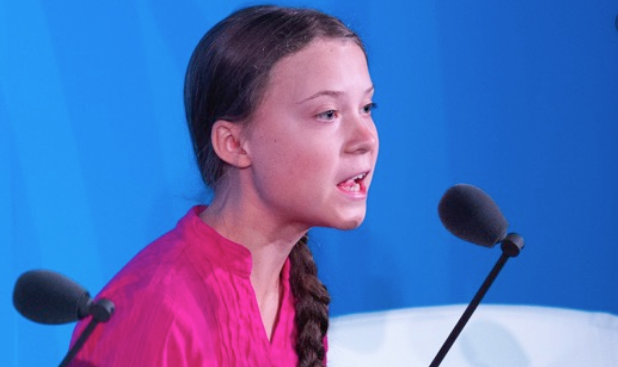Download or listen to this lively Fresh Dialogues interview
We welcome feedback at FreshDialogues.com, click on the Contact Tab | Open Player in New Window
___This week, Greta Thunberg, the Swedish teenager, stole the show at the United Nations General Assembly. Thanks to her, climate change is on the minds of the world. I was invited to discuss climate change action on the BBC World Service this month and we explored the role of activists like Thunberg, indigenous people, and technology pioneers like Elon Musk.
With visible rage, Thunberg described the urgency of action in stark terms on Monday.
”People are suffering, people are dying, entire ecosystems are collapsing. We are in the beginning of a mass extinction and all you can talk about is money and fairytales of eternal economic growth.”
Then Thunberg made a passionate plea to each one of us, especially political leaders, to examine our consciences.
“How dare you continue to look away? The eyes of all future generations are upon you. And if you choose to fail us, I say: We will never forgive you.”
Greta Thunberg’s fury was evident to everyone who watched her, but she ended on a positive note:
“Right here, right now is where we draw the line. The world is waking up. And change is coming, whether you like it or not.”
This powerful young woman speaks for her generation and her fierce, straight-talking message has unsettled certain people, and helped spur record-breaking climate strike demonstrations around the world.
BBC host, Jamie Robertson led a lively discussion exploring the urgency of climate change action and we were joined by ABC Australia’s Clare Negus. I took the opportunity to praise Thunberg’s tenacity.
The program started with a soulful report by the BBC’s Frey Lindsay. He reported on a gathering of indigenous community leaders from around the world who met at University College London to listen, exchange ideas and build solidarity in the fight against environmental degradation and climate change.
Listen to the podcast at the BBC World Service (environmental discussion starts at 10:40)
Listen to the Fresh Dialogues podcast (featuring Greta Thunberg’s powerful words):
.
Here’s a transcript of conversation highlights (edited for length and clarity):
Jamie Robertson: In California, you’re very much on the front line, we think of the wildfires…do indigenous people have a role to play here?
Alison van Diggelen: It’s important for us in California, and around the world, to listen to the indigenous people. What we do over the next ten to twenty years is going to determine the fate of humanity. We need to remember environmentalist, John Muir, who said:
“When we try to pick out anything by itself, we find it hitched to everything else in the universe.”
Technology plays a role in this by increasing transparency. Almost everyone has a mobile phone (and can take photos of environmental abuses), so multinationals can’t get away with what they used to.
Jamie Robertson: How high up the news agenda are questions about environmental problems and climate change?
Alison van Diggelen: Greta Thunberg, bless her heart, is keeping it on our agenda, but I wish it were higher. Looking at the Democratic Party Presidential debates, climate change was there, but I wish we could raise the issue more. People are concerned about what’s impacting them on a daily basis. There’s not enough of a long term view. We need more people like David Attenborough (and Greta Thunberg and Bill McKibben) speaking up for the environment.
Jamie Robertson: Clare ?
Clare Negas: It’s a major criticism of ABC Australia that we do too much on climate change and not enough on cost of living stories!
Jamie Robertson: I want to take the conversation on to the Frankfurt Motor Show and the extraordinary confrontation between the “Lords” of the auto industry and ordinary citizens worried about climate change, worried about cars and what they’re doing to the environment.
Alison, you’re in California at the forefront in the development of electric vehicles and things which could actually make a difference. Is there a sense of optimism that these things will work?
Alison van Diggelen: Absolutely. California is where Elon Musk jumpstarted this electric vehicle revolution. Tesla is doing phenomenally well. They’re due to sell about half a million electric cars this year. California is a state that is doing all it can to boost the sales of electric vehicles (EVs). It accounts for half of all U.S. sales of EVs thanks to rebates and state government policies. It has a goal of getting 5 million EVs on the road by 2030 and it does things like fast tracking permissions for charging infrastructure; that’s a key part of making EVs the number one form of transport.
Elon Musk has predicted that within 10 years, the majority of cars produced will be electric. Others like Morgan Stanley say it’s more like 20 years. It may be somewhere in the middle.
Jamie Robertson: Clare, do you have such faith?
Clare Negas: I do! I think globally electric cars will be the future. In Australia it’ll be a bigger battle because there is such a cultural identity around petrol and diesel fueled engines. We’re a strong car culture and that will continue. A few years ago, we drove a Tesla hundreds of kms to prove it wouldn’t run out of energy. There were no problems. Check out Clare’s fascinating report here.
End of Transcript
Extra: The program included a discussion about the college admissions scandal and I made a shout out to the hard working team and students at Breakthrough Silicon Valley who arguably have the most to lose. Their leader John Hiester recently wrote a moving oped about his outrage at cheaters like Felicity Huffman.
Find out more about clean tech and technology’s role in climate action at Fresh Dialogues.




